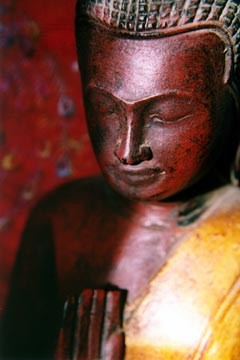Buddhism and an African Greeting
...
This essay is an extension of my post on "The Beauty and Wisdom of African Languages" in my Island of Spice blog. It's an attempt to describe how the emotional associations and meanings of certain African words can create an intuitive bond between people that has a transcendental wisdom and natural beauty. This kind of linguistic intimacy and transference is virtually entirely lacking in English and European languages, and in the Western world we desperately need some way to connect with each other emotionally and intuitively in day-to-day simple encounters. While we have a vast proliferation of words, phrases, technologies, terms and terminologies, we have somehow lost a sense of wholeness and unity that is refreshingly present in African culture.
In the Zulu and Xhosa and the Nguni languages of Southern Africa, many millions of times every day people greet each other by saying "Unjani?" or "Ninjani?" ("How are you?" or "How are you and yours?") and answering "Nkhona" or "Sikhona" ("I am well" or "We are well"). But the word "khona" has an interesting double meaning, as it also means "to be present" or "to be here" and I always thought this was curious pun, and at different times I've tried to work out in my mind the significance of the associations. African languages are full of these words with multiple- layered meanings, and they often lead to many natural intuitive connections and realizations and this is one of the reasons why many Africans feel strongly about using their own languages. I imagine the "khona" double meaning probably evolved from a common saying, "Nkulungkulu nkhona," meaning both "God is good" or "God is here" and "God is present" (with us).
But as I've given it more thought, I'm beginning to wonder if there is a deeper connection in the meanings. If you're speaking one of these languages, you have to know the context of the word in order to intuit whether the speaker means more specifically that the person is "here," or the more general meaning that someone is "good" or "well." I recently had a flash that this idea of goodness can perhaps be related to idea of "presence" in Buddhism. The idea of using the practice of meditation to see things as they are, without mental projections and illusions and to cultivate wisdom ("prajna," in Sanskrit), is central to Buddhism. Buddhist "sitting" meditation involves mindfulness, or continuously watching the mind, observing thoughts and feelings as they arise and fall in consciousness. Through regular meditation and disciplining the mind to be in the here and now--the eternal present--the practictioner develops an ability to cut through the confusion and "mental noise" of distracting thoughts and emotions. The objective or end result of this continuous practice is peace of mind and a strong sense of presence where a person relates to situations and circumstances directly, authentically and honestly, without being lost in labels, categories and extraneous attachments or projections about the past or future. Maybe in this sense being "present" is also something that has an inherent beauty and value in and of itself.
I'm not suggesting that Africans speaking these languages have an outlook on life that is meditative or like a Buddhist worldview. But I do think that this particular use of language lends itself to a similar use of the sense of "presence," in an intuitive connection. When someone asks, "Unjani?" or "Ninjani?" the answer, when it's given intentionally and not mechanically, almost automatically puts the answerer into a frame of mind where the dual meaning becomes salient. In my experience, the greeting has a way of making people feel emotionally grounded with each other in the context of that encounter. The answerer can be saying "I am good," and "I am here" or "We (all of us) are good/here together." In fact, the latter phrase is even more commonly used, as African language speakers more often use the first person plural to build a feeling of inclusiveness. As these meanings reinforce each other, people almost instinctively help create a stronger feeling of presence that can have wider associations.
More presence to listen carefully and hear what others have to say.
More presence to respond compassionately and tactfully.
More presence to think carefully and moderate one's speech.
More presence to recognize the needs of others.
More presence to help avoid misperceptions and misunderstandings.
More presence to see a person and a situation on its own terms.
More presence to stop a situation from unraveling.
More presence to take care of details that later may lead to problems.
More presence to think of a possibility that might not be considered.
More presence to notice something that may be significant to others.
More presence to be aware of children.
More presence to be respectful of elders.
More presence to be aware of neighbors and the people around you.
More presence to be one with a circle of friends and family.
More presence to celebrate the moment.
More presence to affirm the joy of being.
I believe these qualities are at least tangentially associated with the "nkhona" or "sikhona" because they are also elements of African culture itself--the idea of community, inclusiveness, togetherness and family, love, respect for elders, etc. One finds in these constructs a sense of connectedness to other people, a feeling a unity and oneness that is held together in very basic, fundamental day-to-day interactions. Another common answer for "Unjani?" is "Ngiyapila" (I am well) or "Siyapila" (We are well). "Pila" is another African word with multiple meanings. "Pila" can mean "life," or "to live," "to feel," "to be healthy," or "to be well" depending the context. It's fascinating that this root word has so many associated meanings. When a person answers "Siyapila," they are saying "we are well" or "we are alive" or "we are feeling" or "we are healthy" all in one breath, in one simple phrase. In the Nguni languages, life is equated with health, which is equated with being, which is equated with wellness or goodness. Once again, this circular connection of meanings is continually reinforced with African cultural qualities that emphasize unity, oneness, compassion and togetherness. Hence profound meaning, emotion and feeling are transmitted or conveyed with a few elementary words. From a fundamental ground of compassion and unity, there is also no guilt, no sense of separation between God, life, goodness and human existence, and there is an infectious joy and celebration in ordinary encounters.
All cultures and languages have their strengths and limitations. I'm definitely not trying to suggest that African cultures and traditions are perfect. After living in Africa for many years I have my own way of thinking about Africa without trying to idealize or patronize it. The question of why many African countries are burdened with political conflict is an issue that has historical antecedents and is something quite different from the experience of day-to-day language and culture. Despite outward appearances and media images of poverty, strife, disease, etc., there are many things that people living in dominant Western societies can learn from Africa. In the new emerging cultures of the global village, we will all inevitably take constructs of different cultures and different ways of thinking and perceiving and patch them together in our own experience. Africa has many gems of wisdom, many rough diamonds and other treasures--and much to offer in its great reflection.


